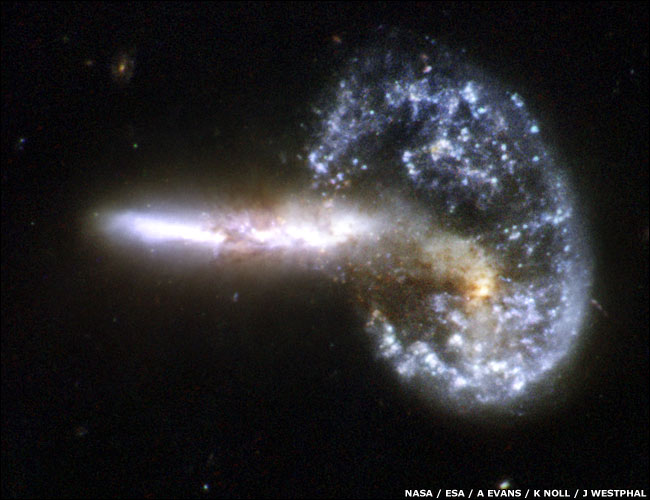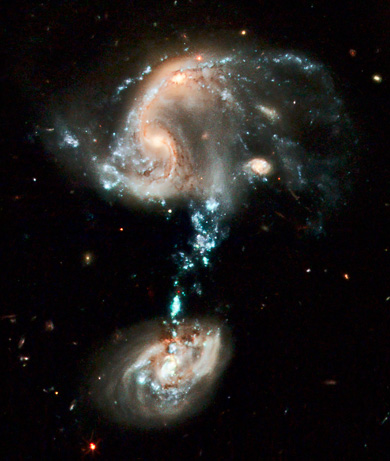dilligaff01":25iaz2vo said:
My questions are about the center of the universe, not directly about the big bang. I'm sure that I'm explaining this poorly because I'm trying to understand this out as I go along
You're doing great. Everyone has the same difficulty understanding this stuff when they are introduced to it. You are in very good company asking these questions

dilligaff01":25iaz2vo said:
but everything we measure is relative because everything we can see is in independent motion (for lack of a better term). We have no definite reference point to gauge anything. We can look at other matter in the universe and gauge it's speed relative to our own and/or to the speed of light but we can't gauge anything about the actual universe itself.
The point with relativity is specifically that the universe has no percievable center. Without a central point there is nothing to measure movement relative to an absolute frame of reference. Since there is no absolute frame of reference (no central point), everything moves in relation to everything else. We do not gauge it relative to the speed of light.
dilligaff01":25iaz2vo said:
If moving many times faster than the speed of light would make it appear that the universe was shrinking, wouldn't moving much slower make it appear that the universe was expanding and throw the calculations off If the earth is moving at Xmph around the sun and the solar system is moving at X10mph in the Milky Way and the Milky Way is moving at X1000mph through the universe and the universe is (?)moving(?) ... (?)spinning(?) X10000000000000mph though (?)whatever then wouldn't that throw everything off from our perspective? I realize theorists don't use mph, this is just to simplify it for me. The people that figured this stuff out are much smarter than I am. Couldn't the universe be neither expanding or contracting but it appeared that it was from our perspective? Possibly all the matter in the universe came from a singularity and is moving away from that point with no effect on the universe itself. Wouldn't that mean the universe has a center but because we are trying to use only the matter in the universe we can't find it?
This is an interesting question and it shows you're really thinking here. Here's the problem; there is no central point, and it's not merely a question of velocities away from it. Think about how an explosion happens. An explosion happens from a central point with material moving away from it. The amount it moves (and spreads) is dependant on where it is in relation to that central point. The further away it is from this central point, the wider the spread, and the slower the rate of accelleration away from it. You can quite literally measure the debris field and determine by going backwards, where the center of the explosion was.
The expansion of the universe does not work that way, which is precisely why we say it is not an explosion.
The first thing to understand here is that the universe is NOT a 3 dimensional object, but we percieve the universe in 3 dimensions. The universe has more dimensions than we can percieve, and this makes it much more difficult to mentally grasp what is happening as it expands. To try to visualize it, we use a 2d to 3d analogy which helps us visualize it, in a very limited way.
To build this analogy we'll use an inflating balloon. You've probably heard the balloon analogy before, but bare with me here anyway.
Now, Imagine an ant walking along a surface of a table. This and, while being a 3 dimensional object, can only percieve it's world in 2 dimensions. It recognizes width and length, but is entirely unable to percieve height. It observes it's entire world as a flat 2 dimensional surface. If you were to hold a pencil, end up, over the table in front of the ant it would not see the pencil, though it would percieve a strange mysterious "shadow" ahead of it. If you put the tip of the pencil on the table it would observe an object appearing out of nowhere, like magic, blocking it's path. You can easily see from this analogy that it's world is more complex than it is able to percieve.
Now let's go back to the balloon. Imagine that we are the ants, and we percieve the universe in 2 dimensions. We live on the surface of the balloon.
As the balloon expands, we observe the expansion as the skin of the balloon stretching everywhere all around us in every direction. We could walk anywhere along the surface of this balloon, and we would never come any closer to the center of the expansion. Every single point along the skin of the balloon is just as close to the center as every other point. Every point of the surface of the balloon is expanding equally to every other, there is literally no center to find.
Now this is not a perfect analogy of course, but it does help you (I hope) to visualize how we observe the universe expanding evenly in every direction. Don't think of it as the universe expanding so much, as stretching. When we think of expansion we tend to think of it expanding FROM a central point, but there really is no central point to be found here. Rather, space is just stretching, and it does so equally in every direction at every single point. It's not stretching FROM a central point. Every single point is stretching just as much as every other point.
If there is a central point causing the stretching we have not found any indication of it at all and are entirely unaware of it. Sorry for the long winded explanation, but I hope it helps you visualize it a bit better.
dilligaff01":25iaz2vo said:
Brighter people than me have re-checked the math that I will never understand, I am just curious about what was taken into account for the computations. That's where all the over-simplified questions are coming from.
Well all the mathematics of course checks out and confirms the model. Also in observing the galaxies we find that they are all rushing away from each other, and that there is no central area they are rushing away from.
As for the simple questions, keep em coming. Don't ever stop asking the simple questions. They are usually the ones that get the most important answers.








